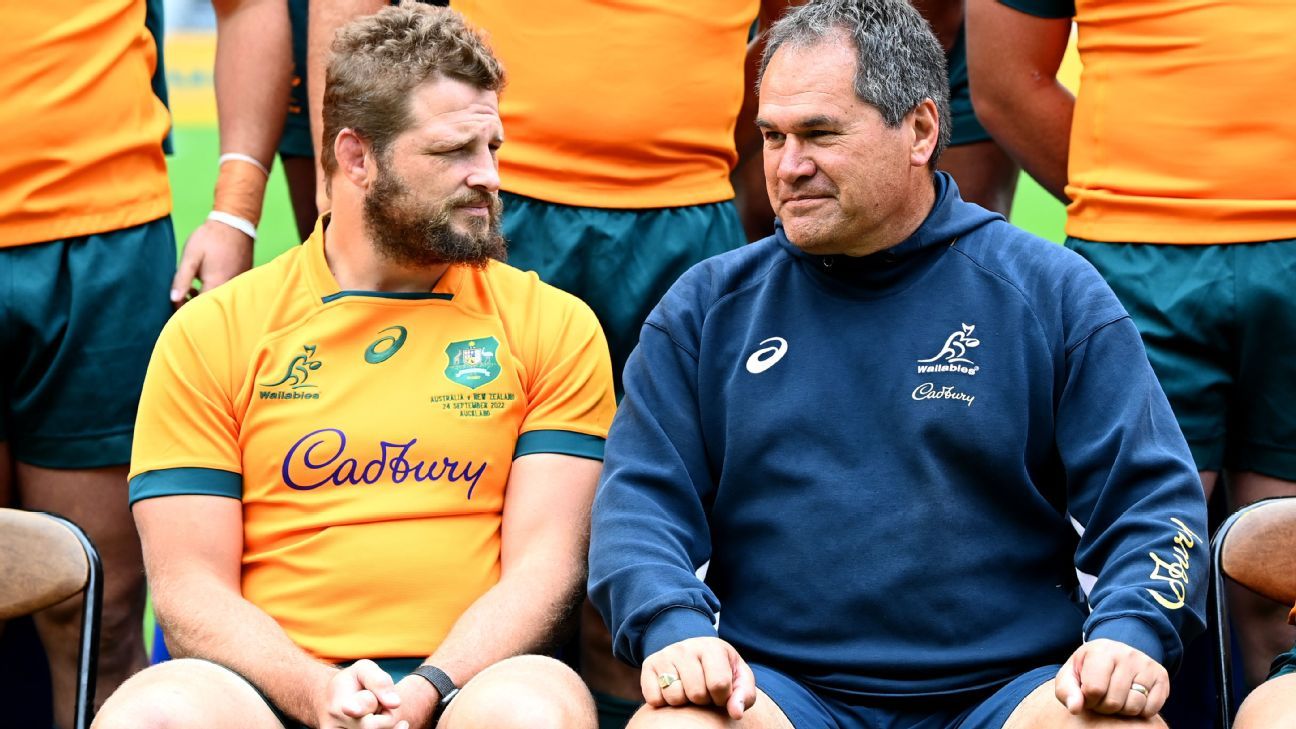Determined to challenge the All Blacks before and after the first whistle, the Wallabies insist their response to the haka is designed to respect, not antagonise, their opponents.
The Wallabies have arrived at their house of horrors, Eden Park, for Saturday night’s Test with New Zealand with the Rugby Championship on the line.
Usually, all eyes in the sold-out crowd would be trained on the All Blacks as they perform their fabled haka before kick-off.
But on Saturday, just as much attention will be on the Wallabies’ boomerang-styled response, an initiative of Australia’s Kiwi coach Dave Rennie.
Rennie brought the boomerang into the spotlight this week, when he revealed All Blacks star Rieko Ioane labelled it disrespectful.
“Rieko Ioane had a lot to say to our boys after the final try, mouthing off at Folau Fainga’a around disrespecting the haka,” Rennie said.
“We don’t have the luxury of having a haka so our response is (to get) in the boomerang shape and to move forward. They’ve thrown down a challenge and we’re accepting it.”
New Zealand captain Sam Whitelock said he welcomed the Australian response.
“They’re doing something they want to do to show they’re together as a country … that’s cool,” he said.
“If they want to do something that makes them feel connected, that’s great. It probably adds to the occasion.”
The All Blacks have become synonymous with the haka, a Maori custom which signifies a challenge, traditionally performed when two tribes met.
Many teams have tried different responses, including linking arms in arms or walking towards the haka.
Pacific nations with similar traditions, including Fiji with their cibi, perform alongside the haka.
Captain James Slipper was eager to point out the boomerang, created with Australia’s First Nations tradition in mind, also wasn’t new.
“We’ve been doing the boomerang for about three years, well ever since Renners [Rennie] came in,” he said.
“All of us boys really want to involve the Indigenous culture within our nation.
“We played in the Indigenous jersey a few times now each year and that’s something we’re really proud of.
“(The boomerang) is just a little bit of a taste of our nation and our way of accepting the challenge.”
Slipper was off the field for the second half and missed Ioane’s feedback, thrown in the aftermath of the 39-37 win.
“Apparently, we disrespected the haka or something like that. By no means was that the case … we respect the haka, we respect the All Black team.”
Rennie explained the boomerang in a 2020 interview with the Sydney Morning Herald.
“I wanted the boys to understand what the haka is about and for us to come up with a way where we’re going to embrace it,” he said.
“A lot of the players say they love it and the energy it brings. Maybe historically though there have been players who feel intimidated by it.
“The idea with the boomerang is that we throw the boomerang out, it hovers above them, mincing up their words, then comes back and brings back an energy to us. It’ll have more meaning with the Indigenous jersey.”
Rugby Australia say they consulted with Indigenous groups in designing their response, including the Lloyd McDermott Rugby Development Team.
Even aside from this recent spat, the All Blacks’ use of the haka can be controversial even in New Zealand.
The team were criticised by some Maori last month for performing the ‘Ka Mate’ variation in Christchurch, given it was written by North Island chief Te Rauparaha, who waged war with the South Island.
Will the boomerang appear again at Eden Park?
On Friday, Slipper said the team hadn’t discussed it, but Rennie appears decided.
“We won’t be stopping that,” he said.
“Is the expectation that we just stand there, they throw a challenge at us and we do nothing? Just take it?”
